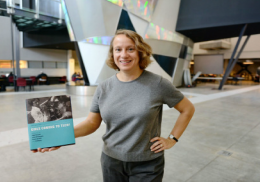
Seminar by Amy Bix (Iowa State University)
Presentation: Enric Novella (IHMC)
Date: 8th of March 2018 4 p.m.
Place: Palau de Cerveró.
Halls: Main Conference Room. Interuniversity Institute "López Piñero".
Title: "Finding More Hidden Women: A Historical Look at Gender in Engineering".
Recent figures place women's representation in engineering at 25% in Sweden and 20% in France and Italy, 18% in Spain, but just 9% in Britain and 155 in the U.S. While patterns vary by country and by discipline, engineering has a highly gendered history. This talk exploresideas and issues surrounding the gendering of technical work from the 1800s to the present. Women over these decades faced both obstacles and opportunities in gaining access to engineering study and employment. Perceptions of masculinity, femininity, work and culture allshaped conditions facing female engineers, raising questions that remain relevant today about gender, knowledge, and social equity.
Biography:
Amy Bix is professor of History at the Iowa State University. Her research connects the history of technology, science, and medicine with studies of women and gender, the history of education, and twentieth-century social, cultural, and intellectual history. Her most recent book, ‘Girls Coming to Tech!’: A History of American Engineering Education for Women (MIT Press, 2013) analyzes how women gained entrance to traditionally male technical fields., including case-studies of Georgia Tech, Caltech, and MIT. This research was honored with three major prizes: the 2015 Margaret Rossiter Prize from the History of Science Society; the 2015 IEEE-USA Award for Distinguished Literary Contributions; and the 2014 Betty Vetter Award for Research from the Women in Engineering ProActive Network. My book in progress, Recruiting Engineer Jane and Astrophysicist Amy, argues that one of the most distinctive changes in modern science and technology is not any specific discovery or technique, but a powerful cultural shift, the commitment to diversify STEM. She details when, how, and why science and engineering, long defined as careers for young white men, were transformed by a high-profile movement to improve girls' STEM education that today commands unprecedented support from scientists and engineers, celebrities, activists, corporations, and the White House. Her other articles, essays, book chapters, and books cover wide-ranging topics in the history of technology, medicine, and science, including the history of eugenics; the body in Islamic culture; Islamic inventions; post-WWII physics and engineering; steampunk culture; gender and alternative medicine; breast cancer and AIDS research funding; consumerism and home repair; technological unemployment fears; and the work of female aviators, physicians, and home economists. She have held fellowships from multiple institutions, including the National Science Foundation, National Endowment for the Humanities, National Academy of Education, and the Smithsonian.
Readings:
1. Amy Bix, "From "Engineeresses" to "Girl Engineers" to "Good Engineers": A History of Women's U.S. Engineering Education,"NWSA Journal, Volume 16, Number 1, Spring 2004, pp. 27-49
and 2. Amy Bix, "Engineering Girls: Youth Advocacy and Gender Stereotypes in American STEM," work in press
Retransmission online: reunion.uv.es/hcc2









